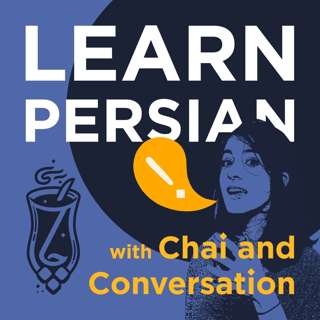
Interview | Growing Up Neem-Rooni- An Interview with Adib Khorram
In this conversation with Adib Khorram, young adult fiction writer, we get to hear about the experiences of growing up as a neem-Rooni. Adib was raised in Kansas City, Missouri by an Iranian father and American mother. He didn't grow up speaking the language, but grew up infused in the culture, which he learned to appreciate after going off to college. He had some great insight and wisdom to share about passing on Iranian language and culture to the next generation.
19 Maj 202021min

Interview | Raising Neem-Roonis- An Interview with Maz Jobrani
In this Raising Neem-Roonis interview, we talk to the most well known Iranian-American comedian, Maz Jobrani. Maz is the father of two half Iranian, half Indian children, ages 9 and 11. He gives advice for those with young children, and shares experiences of people he's met at comedy shows that successfully have held on to their Persian language skills. He also talks about the importance of culture when raising children, and gives advice on how to attract trolls on Twitter.
5 Maj 202022min

Speak Lesson 65 | Food (Vocabulary Sprint)
In this vocabulary sprint lesson, Leyla and her husband Chris go over Persian/ Farsi vocabulary associated with food. Food is an important topic of conversation in Persian culture, as Iranians have a rich history of gathering and celebrating food. In this lesson, we go over different important dishes in Persian culture, such as ghormé sabzi, fesenjoon, and kabob. In addition, we learn the words for different mealtimes. These are: Breakfast - sobhānéLunch - nāharAfternoon snack - asroonéDinner - shām In addition, we talk about drinks, and different parts of a meal such as appetizers and desserts. There are so many topics to cover about Persian food, so in this lesson, we try to get you started with a good selection of vocabulary.
1 Maj 202020min

Interview | Raising Neem-Roonis- An Interview with Arash Karami
In this second Raising Neem-Roonis interview, we talk to Arash Karami, contributor to Al-Monitor and commentator on Iranian politics. We talk about the challenges of passing on the Persian language and culture to the next generation. You can find Arash on Twitter at @thekarami, where he consistently posts about current Iranian politics, and plenty of dad jokes as well. For more interviews, and lesson on conversational Persian, check out our website at www.chaiandconversation.com
28 Apr 202024min

Interview | Raising Neem-Roonis- An Interview with Naz Deravian
Raising Neem-Roonis is our podcast series about the joys and challenges of raising half Iranian children, specifically when it comes to passing along language and culture. Our first interview the series is with actress turned cookbook author Naz Deravian, author of the fantastic cookbook Bottom of the Pot. In addition to her fantastic recipes, her book is full of anecdotes and examples of incorporating her American husband and Neem-Rooni children into the Persian cooking process. After being enamored with her writing style and recipes for over a year, I had so many questions for her about her views on the role of culture in her family.
7 Apr 202032min

Speak Lesson 64 | Transportation (Vocabulary Sprint)
In this Persian/ Farsi lesson, Leyla and her husband Chris go over different vocabulary associated with the topic of transportation, which we are referring to as 'coming and going'- raft ō āmad. We discuss different modes of transportation including: Bicycle - docharkhéCar - māsheenBus - otoboosTaxi - tāxee Metro - metrõAirplane - havāpaymāMotorcycle - motorcycletWe also go over the vocabulary for walking and getting around in general. This lesson is part of our Persian/ Farsi vocabulary sprint series, so we focus on transportation as a theme and learn as many words around the topic as we can.
1 Apr 202015min

Speak Lesson 63 | Time and Date (Vocabulary Sprint)
In this Persian (Farsi) lesson, we go over common vocabulary words for the time and date. This includes the words for the seasons, and the words for the days of the week. The days of the week in Persian are: Monday doshambé دوشَنبهTuesday seshambé سِهشَنبهWednesday chārshambé چِهار شَنبِهThursday panjshambé پَنج شَنبِهFriday jom'é جُمعِهSaturday shambé شَنبِهSunday yekshambé یِک شَنبِه
1 Mars 202012min

Poetry | Omar Khayyam's khosh bāsh Part 3
In this lesson, we go over the following lines of the poem: chon āghebaté kāré jahān neestee hastچون عاقِبَتِ کارِ جَهان نیستی اَستSince the end of the affairs of the world is nothingness engār ké neestee, chō hastee, khosh bāshاِنگار کِه نیستی، چو هَستی خوش باشsuppose that you are not, but while you are, be happyAfter you've listened to this lesson, we would love to see videos of you reciting this poem in a beautiful location- please send your videos to leyla@chaiandconversation.com Andak Andak, a poem by Rumi, and song by Shahram Nazeri, is a wonderful one to listen to about the concept of hastee and neestee.
11 Feb 201912min






















